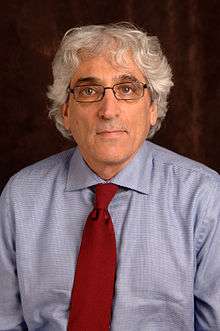Yuval Neria

Yuval Neria (Hebrew: יובל נריה; July 9, 1952, Israel) is a Professor of Medical Psychology at the Departments of Psychiatry and Epidemiology at Columbia University Medical Center (CUMC),[1] and Director of Trauma and PTSD Program, and a Research Scientist at the New York State Psychiatric Institute (NYSPI) and Columbia University Department of Psychiatry.[2]
Early life
Neria grew up in Israel, and spent his childhood in the city of Holon with his younger sister, Nurit, and two parents, Zipora and Jacob Neria. At the age of 18, he joined the Israeli army and subsequently participated in the 1973 Yom Kippur War and the 1982 Lebanon war. He was injured in the Yom Kippur War, and at the age of 22, he was awarded the Medal of Valor, the highest decoration for combat bravery in Israel.[3]
Neria's political views and body of work were deeply influenced by his war experiences.[4] He was one of the founders of the Israeli grassroots movement "Peace Now," which sought to facilitate reconciliation between Israel, the Palestinians, and Arab countries.[5] Neria has published a war novel, Fire (Zmora Bitan, 1986) (Esh in Hebrew), based on his painful experiences in the Yom Kippur 1973 War, and was later involved in efforts to improve policies regarding mental health care for returning war veterans and prisoners of war with post trauma psychopathology.
Education and career
Neria completed his studies in philosophy (BA), political science (BA) and clinical psychology (MA) in the Hebrew University of Jerusalem, and received his doctorate (PhD) in psychology from the Haifa University, Israel, in 1994. He was the recipient of Alon award, and served on the faculty of Tel Aviv University from 1995 to 2001. In the autumn of 2001, after the attacks of September 11, 2001 (9/11) he moved to New York following his recruitment to Columbia University in New York City with his wife, Mariana, a clinical psychologist, and his three children, Michal, Oren and Maya, where they still live today.
Research
Neria's line of research has been focused on understanding the emotional consequences of extreme traumatic events. While his main focus has been the study of posttraumatic stress disorder (PTSD), its course (development, persistence, remission), psychosocial determinants, and underlying neurobiological basis, his studies have shown that the effects of psychological trauma are not limited to PTSD, and are often resulted in other debilitating disorders including bipolar illness, generalized anxiety disorder (GAD), major depressive disorder (MDD), substance and alcohol abuse, borderline personality disorder, complicated grief, functional impairment and physical disorders.
Neria has conducted numerous studies among Israeli veterans and prisoners of war, 9/11 bereaved, low-income primary care patients exposed to 9/11 attacks in New York City, and young adults exposed to ongoing missile and rockets attacks in southern Israel. He received numerous awards from federal and private foundations. To date, his lab at Columbia and NYSPI is funded by the National Institute of Mental Health (NIMH) to conduct novel research of fear-circuitry in PTSD, using clinical, psychophysiological assessments, and multi-modal magnetic resonance imaging (MRI) of the brain.[6]
Publications
Neria is the author of more than 170 articles and book chapters, the lead editor of the books: "9/11: mental health in the wake of terrorist attacks" (Cambridge University Press, 2006) and "The Mental Health Consequences of Disasters" (Cambridge University Press, 2009), and a co-editor of the books "Anxiety Disorders: Theory, Research and Clinical Perspectives." (Cambridge University Press, 2010), and "Interdisciplinary Handbook of Trauma and Culture: (Springer, 2016).
References
- ↑ "Yuval Neria, PhD - Columbia Psychiatry".
- ↑ "Dotster".
- ↑ Avihai Becker (November 13, 2002). "No End to This Bitter Battle". Haaretz.
- ↑ "Lanzmann's Meditation On Israel's Defense". The New York Times. 27 January 1995.
- ↑ Lewis, Anthony (December 7, 1990). "ABROAD AT HOME; 'A Broken Dream'". The New York Times.
- ↑ Rubin, Mikael (2016). "Hippocampal Volume is Associated with Treatment Response in PTSD". Psychiatry Research, Neuroimaging. 252: 36–39. doi:10.1016/j.pscychresns.2016.05.001.